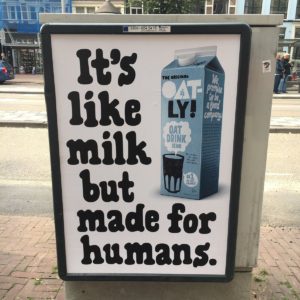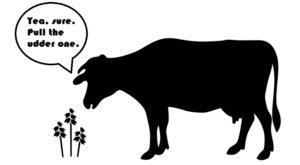
A recent article in the Daily Telegraph 1 about the rise of Oatly dairy alternatives 2 revealed more about the rise of interest in plant-based alternatives to calf growth fluid 3 (‘cow’s milk’ to most people).
- Google reports continued growth over the past 5 years in web searches for alternative milks
- Veganuary continues to record increased participants
- Oatly employs ~300 people
- during 2015-17, UK [and US] sales of cow’s milk rose just 0.3% whilst non-dairy milk grew 9.4% 4
- Oatly 2018 UK sales were £18m, up 89% from 2017
- Oatly 2018 global sales were £87m – they’re hoping to double this in 2019
- in 2015, Oatly was sued by Sweden’s dairy association for the brand’s advertising slogans, which included “It’s like milk, but made for humans” and “Wow, no cow!”

- demand for Oatly – particularly its “Barista edition” milk 5 – is so high, supplies ran dry last year
- a glass of dairy milk produces almost three times the greenhouse gas emissions of any non-dairy milk 6
- cow’s milk is the most environmentally harmful based on three key factors: land use, water use and carbon emissions 6
- buying a carton of oat milk instead of cow’s milk has an immediate positive impact on the environment
- Oatly products are also doing well in China, where a significant number of people are lactose intolerant
- Pettersson, Oatly CEO, says: “Our mission is not to turn people vegan, it’s about everyone making small changes to their diet that will ultimately benefit the planet our children will inherit”
Final thoughts
Previous blogs have looked at other dairy alternatives 7 8 , and how human health may be damaged by dairy consumption 9 10 However, because of the entrenched misinformation that the dairy industry has been pushing for decades, the vast majority of people still believe that good-old dairy simply must be good for our health, in spite of all the scientific evidence to the contrary 11 12 .
Again, we looked previously 13 at how governments are trying (and succeeding, for the time being) to stop producers of dairy alternatives from even being able to use common words such as ‘milk’, ‘dairy’, ‘cheese’, ‘cream’ etc. Big Dairy will not easily give up the fight against dairy alternatives, even if it means strong-arming governments to push through legislation that basically trademarks everyday words.
However, in time, I suspect that all dairy companies will have to make some transition to producing non-dairy alternatives if, that is, they want to share the financial benefits of this growing market.
And we all know how attractive profits are to Big Business, even if it means they are forced to sell something that’s actually good for human health and not just for their balance sheets!

References
- Daily Telegraph 17 January 2019: Wow, no cow! The rise and rise of oat milk manufacturer Oatly by Sophie Christie [↩]
- Oatly Products [↩]
- ‘Cow’s milk’ as baby calf growth fluid: video with Michael Klaper [↩]
- Mintel dairy/non-dairy sales [↩]
- Oatly Barista edition milk [↩]
- Science. 2018 Jun 1;360(6392):987-992. doi: 10.1126/science.aaq0216. Reducing food’s environmental impacts through producers and consumers. Poore J, Nemecek T. [↩] [↩]
- Which Is the Best Non-dairy Milk? [↩]
- Isn’t Plant Milk a Processed Food? [↩]
- Cow’s Milk – But It Looks So Innocent… [↩]
- If You Want Enough Calcium, Forget Milk [↩]
- PCRM: Health Concerns About Dairy
Avoid the Dangers of Dairy with a Plant-Based Diet [↩] - Nutritionfacts: Dairy [↩]
- Never Doubt The Power of Big Farming – EU Law Being Milked [↩]